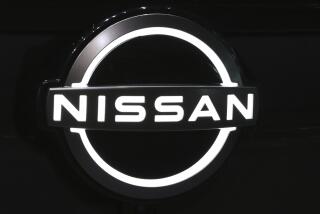Takata air bag blamed for woman’s death in Riverside County crash
- Share via
A 50-year-old woman who died after a car wreck in September in Southern California is the 11th U.S. victim of Takata Corp.’s defective air bag inflators.
The National Highway Traffic Safety Administration confirmed the woman’s death Thursday but didn’t release her name. Up to five people also may have been killed by the air bags in Malaysia, bringing the number of deaths globally to as many as 16.
The woman, identified in Riverside County coroner’s records as Delia Robles, 50, of Corona, was driving a 2001 Honda Civic. Riverside police said in a statement that a man making a left turn in a Chevrolet pickup was hit head-on by the Civic on Sept. 30. The woman was rushed to a nearby hospital, where she died from her injuries, the statement said.
“The left turn: That’s what caused the collision,” police Officer Ryan Railsback told the Riverside Press-Enterprise, adding that police continue to investigate with state and federal help. “They’re still working on whether the air bag system played any role in the death.”
Honda said in a statement that its “thoughts and deepest sympathies are with the family of the driver during this difficult time.”
Robles’ son, Jose Contreras, told KCAL-TV that his mother was driving to get a flu shot when she crashed. He said she was doing 25 mph at the time.
“My mom was a very safe driver. Seat belt was on, always,” he said.
He said he is considering taking legal action.
Takata air bags can inflate with too much force, which causes a metal canister to rupture and spew shrapnel into the vehicle. Tokyo-based Takata, unlike other manufacturers, uses the chemical ammonium nitrate to create a small explosion that inflates air bags in a crash. But the chemical can deteriorate when exposed to prolonged high heat and humidity and can burn faster than designed. That can blow apart a metal canister designed to contain the explosion.
The problem touched off what is now the largest auto recall in U.S. history. More than 69 million inflators have been recalled in the U.S. and more than 100 million worldwide. Takata faces billions in costs.
Honda said the vehicle involved in the California crash had been included in multiple recalls since 2008. The company said it mailed more than 20 recall notices to the car’s registered owners, but its records indicate that the vehicles never were repaired.
In June, NHTSA urged owners of 313,000 older Hondas and Acuras to stop driving them and get them repaired after new tests found that their Takata inflators are extremely dangerous. The agency said it had data showing that chances are as high as 50% that the inflators can explode in a crash.
NHTSA’s urgent advisory covers vehicles that are up to 16 years old, including 2001 and 2002 Honda Civics and Accords, the 2002 and 2003 Acura TL, the 2002 Honda Odyssey and CR-V and the 2003 Acura CL and Honda Pilot, NHTSA said. They were recalled from 2008 to 2011, and about 70% of them already have been repaired, the agency said.
The older the inflators are and the more time they spend in heat and humidity, the more likely they are to malfunction.
The government urged people to go to safercar.gov and enter their vehicle identification number to see whether their car or truck is being recalled.
ALSO
Look, no hands: Watch a Tesla car drive around and park itself
Many ‘genuine’ Apple products on Amazon are dangerous fakes, Apple says
What did Wells Fargo’s new CEO know about the scandal? Senators push for answers
UPDATES:
Oct. 21, 7:05 a.m.: This article was updated with more information about the victim.
Oct. 20, 4:55 p.m.: This article was updated with comments from Honda and additional background information.
This article was originally published at 3:50 p.m. Oct. 20.






